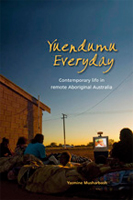Yuendumu Everyday: Contemporary life in remote Aboriginal Australia
Summary
Yuendumu everyday explores intimacy, immediacy and mobility as the core principles underpinning contemporary everyday life in a central Australian Aboriginal settlement. It analyses an everyday shaped through the interplay between a not so distant hunter–gatherer past and the realities of living in a first-world nation–state by considering such apparently mundane matters as: What is a camp? How does that relate to houses? Who sleeps where, and next to whom? Why does this constantly change? What and where are the public/private boundaries? And most importantly: How do Indigenous people in praxis relate to each other?
Employing a refreshingly readable writing style, Musharbash includes rich vignettes, including narrative portraits of five Warlpiri women. Musharbash’s descriptions and analyses of their actions and the situations in which they find themselves transcend the general and illuminate the personal. She invites readers to ponder the questions raised by the book, not just at an abstract level, but as they relate to people’s actual lives. In doing so, readers will expand their understandings of Indigenous Australia.
Yasmine Musharbash spent three years of participant observation in the Warlpiri camps of Yuendumu, as a postgraduate of the Australian National University and is a Postdoctoral Fellow with the University of Western Australia.
Reviews and endorsements
'Yuendumu Everyday is an enjoyable, insightful, and important examination of some underappreciated cultural dimensions of an underappreciated part of the world, and Musharbash is to be congratulated for her ground-level research and her thoughtfulness in making the everyday anthropologically meaningful.'
— Jack Eller, Anthropology Review Database, 31 July 2010
'It is something of a truism that good ethnographies illuminate the differences between societies as well as the common humanity that binds them. Yuendumu Everyday delivers on both accounts. Musharbash offers a rich exposition of profound details of daily life and a respectful gloss on their meanings. She helps us to see both the Warlpiri's view of themselves and our perceptions of them. But best of all, she succeeds in bringing those two perspectives into closer alignment.'
— Will Owen, Aboriginal Art & Culture, 8 March 2009
'Yuendumu Everyday is an informative ethnographic account of mundane life among Aboriginal people …Musharbash performs an impressive act of cross-cultural translation, presenting her findings in a highly readable form.'
— David Trigger, The Australia Literary Review, 3 June 2009
